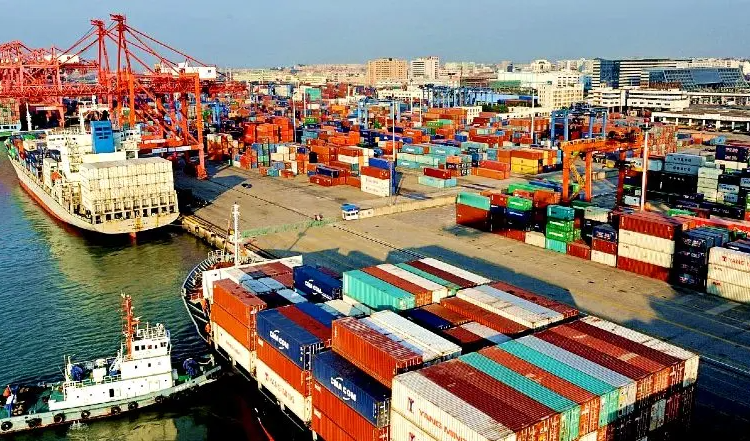Within three years, the construction of the Lekki deep seaport was started, ending with commercial vessels now berthing successfully at the terminal.
Construction of the Lekki Deep Sea Port began in July 2020 during the pandemic, was completed in October 2022, and started commercial operation in the second quarter of 2023.
The port that was initially seen as a white elephant project by stakeholders in the maritime sector now represents another milestone and watershed in the nation’s quest for economic development.
The project became achievable because the promoters were able to secure funding from relevant financial institutions especially foreign development banks to commence the construction and it aided completion of the project in record time.
Undoubtedly, the first phase of the $1.5 billion Lekki deep seaport was built, completed and commissioned by President Muhammadu Buhari on Monday, January 23rd, 2023.
However, after the commissioning, the Lekki deep seaport commenced commercial operation in the second quarter of 2023 and have been receiving container laden vessels since then.
Though the port has its own peculiar challenges, they are surmountable challenges that need to be addressed by the federal government.
For instance, the connection of the port to rail, construction of access roads to the ports for easy evacuation of cargoes among others but, these challenges which are not the fault of the promoters, have been receiving attention from the government.
However, the port, according to maritime experts, was the deepest and biggest in west Africa sub-region. They argued that the port has the most sophisticated equipment, and an automated process which would be used to wrest transit cargoes from neighboring countries.
To achieve this, the promoters of the port said $100million was invested in cargo and terminal handling equipment as those equipment in the seaport could only be found in ports in Europe or middle -East.
Speaking to LEADERSHIP, the promoters of the Lekki Deep Sea Port- Lekki Port LFTZ Enterprise Limited (LPLEL) and the terminal operator-Lekki Freeport Terminal (LFT), expressed the readiness of the Port for transhipment operations and restore the status of Nigeria as a cargo transhipment hub, especially within the West Africa region.
The chief executive officer of Lekki Freeport Terminal, Yann Magarian, said the Port is strategically positioned and well-equipped to help recover the transhipment of cargo lost to neighbouring West African countries and landlocked countries such as Niger and Chad Republic.
“We have had meaningful discussions with all the necessary stakeholders, including Nigerian Ports Authority and the Nigerian Customs Service, and we are confident of recovering transhipment cargo not only for the hinterland but also landlocked countries and other countries in Africa,” he said.
Emphasising on the equipment, Magarian noted that Lekki Port is the first Port in the region with sophisticated equipment, such as Ship to Shore (STS) cranes, to handle and discharge cargo from some of the largest vessels in the world. He stressed that the Port is fully automated to the extent that it limits as much human interface as is common with existing ports.
Magarian further disclosed that the Lekki Port would shape the maritime economy of the country and called on Nigerians to embrace and promote the port.
He disclosed that the port is fully automated to eliminate human contacts and well equipped as some of the equipment seen in the terminal, especially the ship-to-shore crane at the port is mostly seen in big ports in Dubai and Singapore.
He added that the Lekki Port can do a lot for Nigeria in terms of generating revenue worth billions of dollars and create thousands of jobs for Nigerians.
Also speaking, the chief operating officer Lekki Port, Laurence Smith, noted that the Lekki Port project remains a watershed in the history of maritime in Nigeria, urging stakeholders, including the media, to continue to lend their support by promoting it.
“This is the gateway to the maritime and beyond. I have not seen any investment like this anywhere other than in Dubai. This port can generate hundreds of millions of dollars in revenue for Nigeria and hundreds of thousands of jobs”, Smith said.
On his part, the chief commercial officer, LFT, Kehinde Olubi-Neye, said the Port has the needed equipment and the draft to recover transship cargo bound for landlocked neighbouring countries back into the country.
“The Lekki Freeport Terminal has discussed with stakeholders including Nigeria Customs Service and that they are confident that recovering transshipment cargo not just for the hinterland but also for landlocked countries and other regional countries will be back in the country,” he said.
However, he said the port has also seen the opportunity to play a role in the uptake of cargo in the Eastern Ports, which is why they are currently having discussions on moving containers discharged at Lekki Port by barge to the Eastern Ports of Calabar, Warri, and Onitsha River Port among others to help increase the economy of those ports.
Speaking on the prospect of Lekki port, the former president, National Association of Government Approved Freight Forwarders (NAGAFF), Eugene Nweke, said the size and efficiency of a port is an indication of how successful the surrounding regions are.
According to him, brown ports managed by private operators have to square up for competition to avoid serving as mere feeder ports.
“To facilitate movement in any given port, raft such as boats, ships and barges are required to move both people and goods, but to facilitate trade, the port has to provide the docks, floats, piers, gangway, tugboat, and other conveniences that will make the ships to be properly engaged and utilised and as well accommodate and maintain seamless flow of watercraft traffic.
“With the increase in the volume of world trading activities on the sea (imports and exports), it is considerate to posit that the size and efficiency of a port is an indication of how successful the surrounding regions are as such ports are vital components of shipping business.
“With the commissioning of the first deep seaport, it has become necessary and also advisable that the crop of brown ports managed by private operators has to square up for competition to avoid serving as mere feeder ports. In this regards, the ongoing negotiations for port concession renewals, should consider such critical industry components ranging from the right definitions of operational activities and phrases and operational rebates and tax regime”, he said





